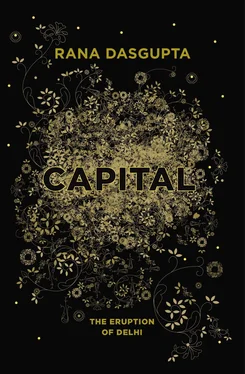“Look at the businessmen around you. Here. They build obscene houses. They have all these obese children who will eat themselves into an empty grave. Then there will be endless property disputes. And then what? And then what? What is their vision of life? You make money, then you die. You just accumulate a big fortune, and you go on and on and on, and you never do anything else. And then what? I mean how much money do I need? Once I have my apartment in New York and I fly everywhere first class, how much more do I really need? I’m going to change the world with my money. Which is why I need to make so much.”
“So you’re working for the benefit of those less fortunate than yourself?”
“I wouldn’t say that. I mean, I did go to a liberal American college, and that’s what I am in my heart. But when I’m running the company, I’m the stereotypically evil capitalist. I’m like a character from Hard Times . I order people about and tell them to polish my shoes. I make sure servants don’t get above themselves.”
It happens that I have come to see Rahul directly from one of the camps set up for the labourers who came to Delhi to work on the infrastructure for the Commonwealth Games, and I am still disturbed by the experience. I cannot help responding to Rahul’s comment with an account of what I have seen in that pathetically overcrowded place. Workers and their families sleep in windowless corrugated iron shacks, and there are ten toilets for about 3,000 people. With the monsoon rains, the whole place is under water: wandering children have fallen into unseen holes in the ground and drowned; mosquitoes have reproduced exuberantly and spread malaria throughout the camp. I have spent the afternoon talking to those too sick to be out at work. They are not paid for the days they do not work, and cannot visit a doctor. They wonder if they will ever make it back to their far-off homes.
“It’s not necessary that it be so bad,” I say. “It’s bad by design. It’s obstinately bad. It’s impossible not to feel it is sadistic.”
“I’m sure if I were to see that I would feel the same,” says Rahul. He pauses, thinking about his feelings, and adds, “But if I saw those people, I am sure I would also feel contempt.”
Rahul’s grandfather comes out into the driveway. He gives us a merry wave and climbs into the back of a Mercedes, which pulls away. Guards open the gates, and the car drives away. Rahul and I contemplate his departure.
“He’s extraordinary,” I say.
“He is,” Rahul replies. “There’s no one I respect more. But you shouldn’t think he was always like this. In his own day, he was a bastard. Ran this family like a tyrant.”
• • •
Family businesses had several clear advantages over more impersonal structures, and these derived not least from their martial culture. They bred not employees but cult members, whose motivation was not just money but glory. These members accepted authoritarian conditions that employees would not. Sons could be dispatched overnight to spend years on the other side of the world. Wives managed the substantial social and familial duties of a wealthy businessman so that he did not need to. It was a dynamic structure that exploited its human resources in a far more primordial way than the average corporation. Fully owned, usually, by the family itself, no one else interfered with business strategy, and major decisions could be taken over dinner.
So the family did indeed require ‘running’. Parenting was a critical business skill. Paternal authority was essential, but when the entire business depended on sons taking over from their fathers, this authority could not be naively applied. Fathers knew that if their sons knew nothing except authority, they would either run away or become idiots. They choreographed an elegant dance with their teenage offspring, therefore, which allowed substantial liberties along the way, and even gave youngsters the idea, when they finally came home to join the business, that they had chosen it of their own free will. Mothers were often exceptional personalities, deploying an astonishing range of resources to manage these complex human dynamics, and ensuring that the inflexible family structure was nonetheless abundant with spiritual and chivalric meaning.
One of the advantages of all this is that there was great continuity of purpose in business families, even through the white-hot economic environment of the post-liberalisation period. They did not have to deal with the metaphysical shock that struck more liberal, ‘middle-class’ families over the same period, for whom everything suddenly changed. In business families, sons did work just like their fathers, and marriages were reassuringly patriarchal — so it was possible to watch calmly as the rest of Indian society tottered in disorientation, and to profit from the chaos. As we have seen, north Indian business families have always considered themselves to be at war, and the sight of calamity and destruction revives their spirits. The early twenty-first-century shake-up allowed the more forward-thinking of these families to greatly increase their economic reach. They understood, as many of the middle classes did not, that endless accumulation required the constant production of the new, which could only happen through perennial destruction. This is what Dostoevsky was referring to when he observed, in London in 1862, “that apparent disorder that is in actuality the highest degree of bourgeois order”. 31The business family was a structure that was designed to ride undismayed through the storm of disorder, and to profit from it.
But the risks were high. One of the reasons that legend speaks so exuberantly of the perfect warrior is that he — or she — is an extremely rare occurrence. Knights are flawed and fragile, and often allow inscrutable urges to divert them from their calling.
Those young men whose fathers briefly sponsored their interests in photography or music — buying them the most expensive cameras or drum kits, allowing them the freedom of girlfriends and months of travel — gave themselves intensely to these pleasures because they knew they would expire; and when the time came to get married and join the family firm, they did so obediently, because their life had never been about ‘personal fulfilment’ or any such civilian nonsense: the warrior ethos was built on sacrifice, and they had always known they would eventually have to give themselves to their calling. It was painful to leave behind girlfriends and lifestyles they loved, but it was precisely this pain that sharpened their martial resolve. They threw themselves into work with the torrid sense that otherwise they would die.
And yet. It did not always work. So many things could go wrong. If fathers were painfully preoccupied with their sons’ characters and life choices, it was because reproducing the warrior ethos from one generation to the next was extremely difficult. Sometimes alcohol and other addictions came to take the place of all those things young men had allowed themselves to dream of. They beat the wives who had been thrust on them, who, in their turn, turned to addictions to cope with a life in which bearing children was their main significance.
In some cases, the situation became fatal. I heard of a businessman who had no heir and therefore adopted a son from one of his brothers, who had several. The boy was already in his teens: he was good at sports and had no interest in commerce. His real parents felt it was better if they did not see him so he would settle in better with his new environment, and his new parents began to groom him to take over an enormous business. They married him to a wealthy girl from another business family. He told his family he was not happy, but they did not realise how serious he was. Eventually, the burden of what he knew he could not do became too great for him, and he killed himself.
Читать дальше











